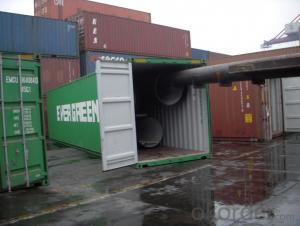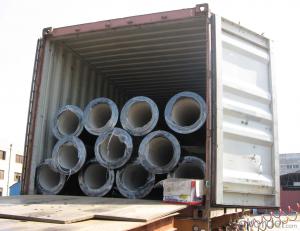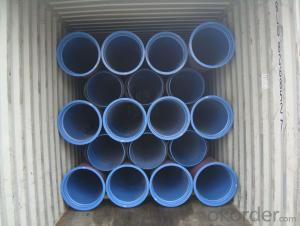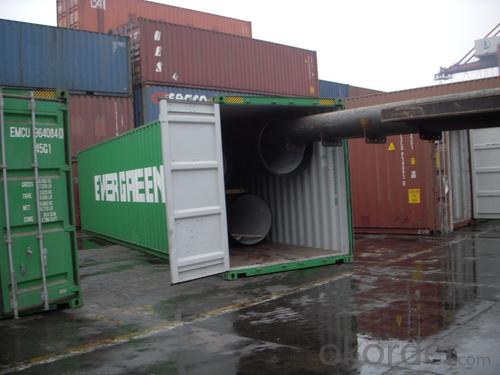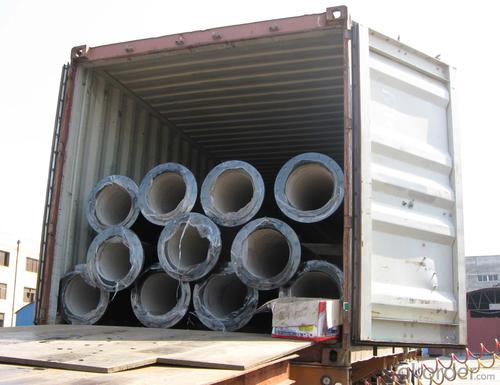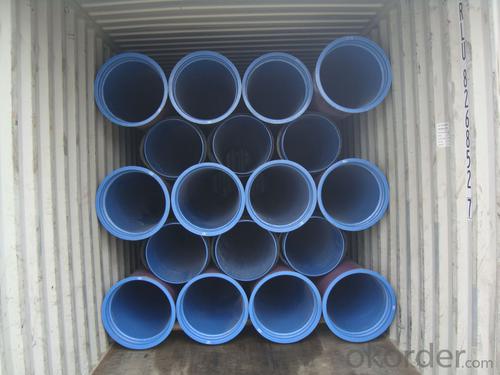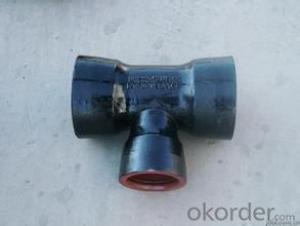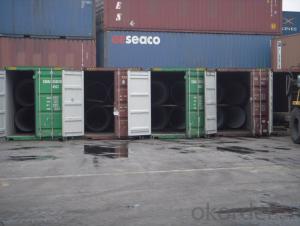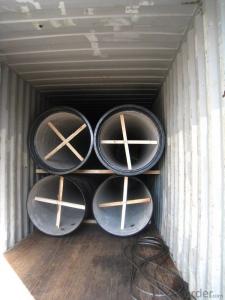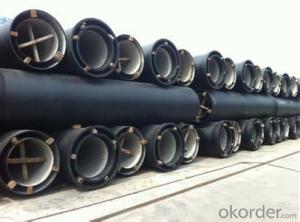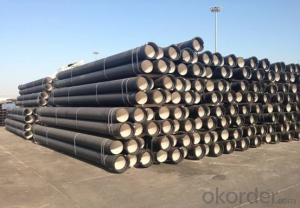DUCTILE IRON PIPES C Class DN700
- Loading Port:
- China Main Port
- Payment Terms:
- TT OR LC
- Min Order Qty:
- -
- Supply Capability:
- -
OKorder Service Pledge
OKorder Financial Service
You Might Also Like
Ductile Iron Cast Pipe is without any defects compare with tradition casting tech, which has many advantages particularly as follow:
(1) High density. In the "vertical upward casting" process, the melt iron of centre liquid column in center crystallizer is continuously feeding for volume shrinkage caused by condensation tube at outer circumference , which lead to be free of shrinkage porosity.
(2) High purity. When melt iron pouring, the mixed impurities such as gas, dross, sand grain which are lighter than melt iron could be eliminated at furnace mouth, its impossible to enter into the crystallizer through the channel, so the melt iron into the crystallizer is very pure.
(3) Strength with toughness. The cooling speed provided by continuous crystallizer is 30 times than sand casting and 5 times than centrifugal casting, and doesn't produce white iron, the eutectic cell volume of continuous cast iron is one eighth to one tenth compare with traditional cast iron. The density of graphite nodule in ductile iron can reach 300-700 pcs/mm2. Therefore, all reason above improve the strength and toughness of continuous cast iron.
(4) Free machining. The high speed cooling make the hardening phase (such as boride, steadite) not appear like reticular, massive or thick, but diffuse like fish bone and pane in shape, moreover, there are tiny graphite flakes inlaid hardening phase. It's free machining in BrinellHardness the range of 250-300HB. However, the Brinell Hardness of 250 is top limit to common metal materials.
(5) Uniform composition of tube wall. The convection mixing of liquid column caused by marching type drawing in crystallizer make the composition of tube wall well-distributed, and concentration gradient very little.
(6) High productivity. To the wall thickness of tube under 10mm, the speed of continuous casting is 1 meter/min, to the wall thickness of tube under 20mm, the speed of continuous casting is 0.5 meter/min, which is high efficiency that centrifugal or other casting tech couldn't reach.
- Q: How does ductile iron pipe perform in extreme temperatures?
- Ductile iron pipe is known for its exceptional performance in extreme temperatures. Due to its unique composition and manufacturing process, ductile iron pipe can withstand both high and low temperatures without compromising its structural integrity. In high-temperature environments, ductile iron pipe demonstrates excellent heat resistance. It can withstand temperatures up to 1000 degrees Fahrenheit, making it suitable for applications that involve hot liquids or gases, such as steam pipelines or industrial processes. The high strength and thermal stability of ductile iron allow it to maintain its shape and structural integrity even under extreme heat conditions, ensuring long-term reliability and safety. Similarly, ductile iron pipe also performs well in low-temperature environments. It can endure sub-zero temperatures without becoming brittle or prone to cracking, which is a common issue with other materials like cast iron. This makes ductile iron pipe ideal for applications in cold climates, such as water distribution systems in freezing temperatures. Furthermore, ductile iron pipe's ability to resist thermal expansion and contraction is another advantage in extreme temperatures. It has a low coefficient of thermal expansion, meaning it expands and contracts less compared to other materials. This property helps to minimize the stress on the pipe and reduces the risk of leaks or failures caused by temperature fluctuations. In summary, ductile iron pipe exhibits exceptional performance in extreme temperatures. Its heat resistance, ability to withstand low temperatures, and resistance to thermal expansion and contraction make it a reliable choice for various applications, ensuring safe and efficient operations even in challenging environments.
- Q: Can ductile iron pipes be used for bridge piers?
- Bridge piers can indeed utilize ductile iron pipes. These pipes possess remarkable strength and durability, rendering them suitable for various purposes, bridge construction included. Their resistance to corrosion is exceptional, and they withstand heavy loads with ease, making them a dependable choice for supporting bridge piers. Moreover, ductile iron pipes offer convenient installation and maintenance, which can be advantageous in bridge construction endeavors. Nonetheless, it is crucial to account for the specific requirements and design specifications of the bridge prior to selecting ductile iron pipes as the material for its piers. Thorough engineering evaluation and consideration of factors like load capacity, soil conditions, and environmental elements are indispensable for guaranteeing the suitability and safety of employing ductile iron pipes for bridge piers.
- Q: How does ductile iron pipe perform in areas with high traffic loads?
- Areas with high traffic loads greatly benefit from the exceptional performance of ductile iron pipe. Its superior strength and durability enable it to effectively handle heavy loads and withstand the impact caused by vehicular traffic. Ductile iron pipes possess a high resistance to bending and cracking, making them an ideal choice for applications in roadways, highways, and other areas with high traffic. The ability of ductile iron pipe to distribute weight and pressure exerted by heavy traffic loads is a result of its high strength. This reduces the risk of deformation or failure, making it a reliable option for transporting water, sewage, and other fluids in areas commonly frequented by heavy vehicles. Moreover, ductile iron pipe displays excellent corrosion resistance, further enhancing its performance in high traffic areas. It can withstand exposure to various environmental conditions, such as moisture, chemicals, and abrasion, without compromising its structural integrity. This durability translates into minimal maintenance requirements and a long service life, making it a cost-effective solution. In addition, the smooth internal surface of ductile iron pipe minimizes friction and allows for efficient flow of liquids. This reduces energy consumption and maximizes the hydraulic capacity of the pipe, which is particularly advantageous in areas with high traffic loads where the demand for water or wastewater transportation is often high. To summarize, ductile iron pipe is a reliable and durable choice for areas with high traffic loads. Its strength, resistance to bending and cracking, corrosion resistance, and efficient flow characteristics make it an excellent option for transportation systems in roadways, highways, and other heavily trafficked areas.
- Q: What is the composition of ductile iron pipes?
- Ductile iron pipes are primarily composed of iron, with small amounts of carbon, silicon, manganese, and trace elements such as sulfur and phosphorus.
- Q: Can ductile iron pipes be used for underground slurry pipelines?
- Yes, ductile iron pipes can be used for underground slurry pipelines. Ductile iron pipes are known for their strength, durability, and resistance to corrosion, making them suitable for a variety of applications including underground slurry pipelines. They provide a reliable and cost-effective solution for transporting slurry, which is a mixture of solids and liquids, over long distances. The inherent toughness and flexibility of ductile iron pipes allow them to withstand the abrasive nature of slurry and the external loads associated with underground installation. Additionally, ductile iron pipes can be easily joined using various methods, ensuring a secure and leak-free pipeline system. However, it is important to consider the specific properties of the slurry being transported and consult with experts to determine the appropriate pipe specifications and design considerations for the underground slurry pipeline.
- Q: How does ductile iron pipe resist internal corrosion?
- Ductile iron pipe resists internal corrosion through a combination of its unique material properties and protective coatings. Firstly, ductile iron, also known as nodular cast iron, is made by adding magnesium to molten iron, which causes the graphite in the material to be nodular or spherical in shape. This results in a more flexible and elastic material compared to traditional cast iron, making it less prone to cracking or fracturing under stress. Additionally, ductile iron has a dense, microstructure with a high carbon content, which acts as a barrier to prevent corrosive elements from penetrating the pipe's surface. This inherent resistance to corrosion makes ductile iron pipe suitable for carrying various fluids such as water, sewage, and chemicals without the risk of degradation over time. Furthermore, ductile iron pipes are often internally lined with protective coatings to further enhance their resistance to corrosion. These coatings, such as cement mortar or epoxy, create a barrier between the pipe's surface and the fluid it carries, preventing direct contact and reducing the likelihood of corrosion. These linings are applied during the manufacturing process, ensuring a consistent and durable protection throughout the entire length of the pipe. In summary, ductile iron pipe resists internal corrosion due to its material composition, including the nodular graphite structure and high carbon content, as well as the application of protective coatings. This combination of factors ensures the longevity and reliability of ductile iron pipes in various applications, even in corrosive environments.
- Q: Can ductile iron pipes be used for geothermal heating and cooling systems?
- Geothermal heating and cooling systems can utilize ductile iron pipes, as they possess the necessary strength and durability to withstand the high temperatures and pressures involved. The exceptional corrosion resistance of ductile iron is vital for ensuring long-term functionality when used underground in applications like geothermal systems. Moreover, the high thermal conductivity of ductile iron pipes enables efficient heat transfer within geothermal systems. Therefore, due to their strength, durability, corrosion resistance, and thermal conductivity, ductile iron pipes are a suitable option for geothermal heating and cooling systems.
- Q: How do ductile iron pipes perform in earthquake-induced ground movements?
- Ductile iron pipes have been proven to be a dependable and resilient choice for underground infrastructure, even in earthquake-prone regions. The distinctive qualities of ductile iron, such as its strength and flexibility, enable it to withstand the impacts of ground movements during an earthquake. When an earthquake occurs, the ground shakes and shifts, exerting significant forces on underground pipes. Ductile iron pipes possess the ability to flex under these forces, absorbing the energy and minimizing the risk of failure. They can endure substantial ground movements without cracking or breaking, guaranteeing the uninterrupted flow of water or other fluids. Moreover, ductile iron pipes exhibit exceptional resistance to corrosion and are highly durable, making them suitable for long-term use in areas susceptible to earthquakes. This reduces the necessity for frequent maintenance or replacement, providing cost-effective and reliable solutions for infrastructure. Additionally, the joints employed in ductile iron pipe installations are designed to accommodate movement and permit slight adjustments during ground shifts. This adaptability prevents the pipes from becoming dislodged or separated, preserving the system's integrity. Overall, ductile iron pipes have a well-established reputation for their performance in earthquake-induced ground movements. They offer resilience, flexibility, and durability, ensuring the uninterrupted operation of water and sewer systems, even in areas prone to seismic activity.
- Q: Is there any cast iron pipe used in the fire hose?
- No, I think so. In theory, you can.See if the specifications have any requirements for the material.
- Q: What is the typical weight of ductile iron pipes?
- The typical weight of ductile iron pipes can vary depending on their size and thickness. However, as a general guideline, ductile iron pipes commonly range in weight from around 1 pound per foot for smaller diameter pipes to several hundred pounds per foot for larger diameter pipes. The weight of ductile iron pipes is determined by factors such as the pipe's dimensions, the thickness of its walls, and the specific requirements of the intended application. It is important to note that these weights are approximate and can vary based on the specific manufacturer and product specifications.
Send your message to us
DUCTILE IRON PIPES C Class DN700
- Loading Port:
- China Main Port
- Payment Terms:
- TT OR LC
- Min Order Qty:
- -
- Supply Capability:
- -
OKorder Service Pledge
OKorder Financial Service
Similar products
Hot products
Hot Searches
Related keywords
